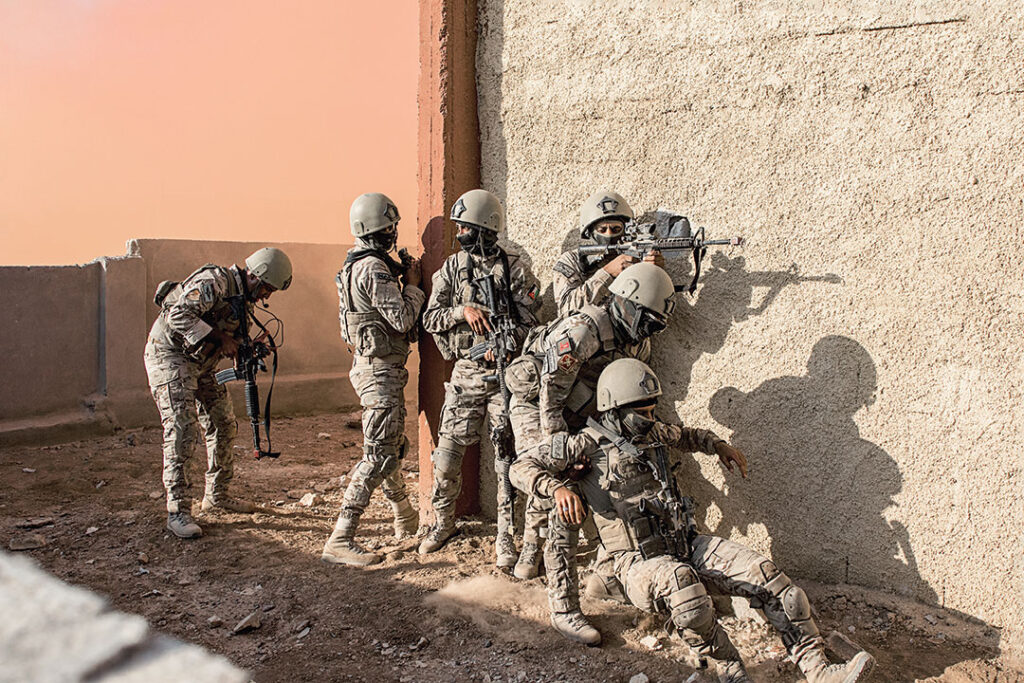Eight Thousand Troops Attend Jordan’s Eager Lion 19 Exercise in a Show of Regional Unity
UNIPATH STAFF
They captured villages, cleared mines, scaled buildings, evacuated wounded, rescued hostages, defended coastlines, repulsed terrorists and parachuted from planes.
But what the 8,000 participants at Jordan’s Eager Lion 19 military exercise achieved most of all was unity of purpose on the battlefield despite cultural, linguistic, logistical and technological differences.
Twenty-nine nations combined forces across Jordan in late August and early September 2019 in a demonstration of proficiency designed to defy enemies they might encounter in the region.
In addition to troops from the host nations of Jordan and the United States, participants arrived from Australia, Austria, Bahrain, Belgium, Brunei, Canada, Cyprus, the Czech Republic, Egypt, France, Germany, Greece, Iraq, Italy, Japan, Kenya, Kuwait, Lebanon, the Netherlands, Norway, Qatar, Pakistan, Saudi Arabia, Spain, Tajikistan, the United Arab Emirates and the United Kingdom.
The complexity of the training scenarios matched the diversity of the participating forces. Troops from across the region had to counter not only independent, Daesh-like extremists, but state-sponsored militias backed by an aspiring regional hegemon.
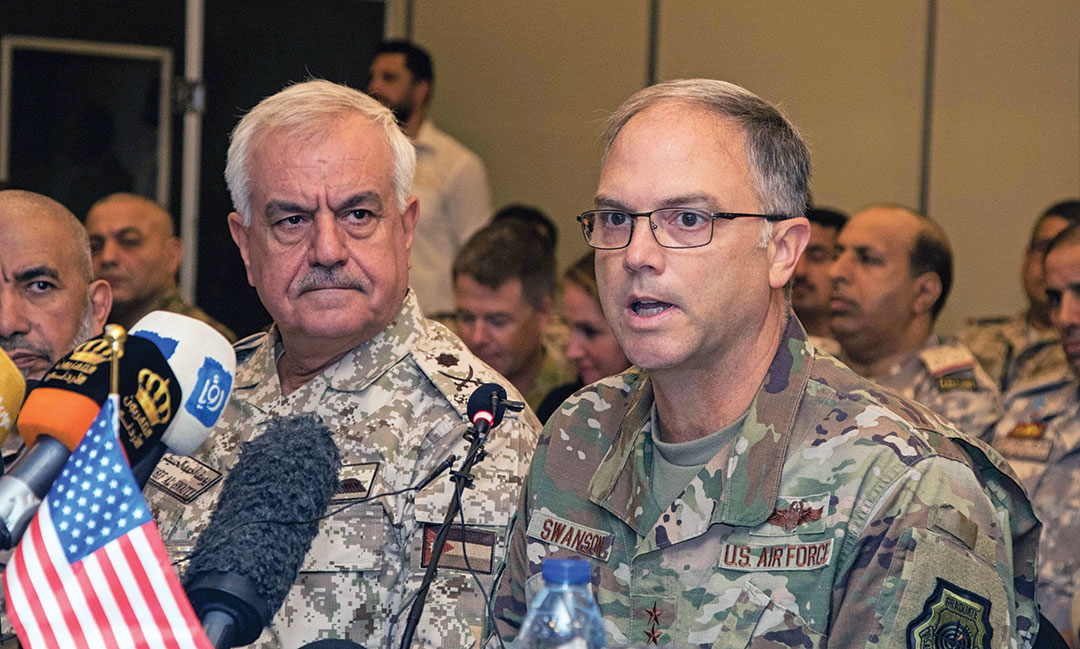
30 countries during a senior leader seminar. SPC. SHADRACH HICKS/U.S. ARMY NATIONAL GUARD
“Traditional and emerging foes will continue to develop their capabilities, and we must do likewise together,” said Jordanian Chairman of the Joints Chiefs of Staff Maj. Gen. Yousef Al-Hunaiti. “We must strive to defeat not only our foes’ forces but also their ideology. Only by training together for the worst possible scenarios can we safeguard our society for future generations.”
Emblematic of that spirit of partnership were missions that required superior multinational coordination, including a massive live-fire demonstration on the rolling desert, special operations forces raids and a maritime assault targeting a hijacked ocean liner.
In a Combined Arms Live Fire Exercise on the final day of Eager Lion, Qatari quick reaction forces reinforced a Jordanian/U.S. operation to dislodge terrorists attempting a border incursion. Behind the front lines, a medical platoon from Saudi Arabia prepared to evacuate casualties.
Maj. Gen. Al-Hunaiti and U.S. Central Command Commander Gen. Kenneth McKenzie attended the event from an observation tent on a sandy knoll in the stony, bone-dry Jordanian Badia. They were joined by officers from dozens of countries.
Aerial attacks by helicopters, F-16 fighters and a B-52 bomber complemented artillery bombardments and missile fire from radar-guided high mobility artillery rocket system (HIMARS) batteries. Advancing tanks raked ridges with fire as a rocket-propelled explosive charge designed to destroy mines cleared a path across the desert floor.
“Being able to coordinate with the countries that we have here and actually conduct military operations alongside of them sends an important message to the entire region, that the U.S. and our allies are focused on stability,” said U.S. Army Col. Grant Fawcett, whose Kuwait-based troops were engaged in the demonstration.
Jordan Armed Forces (JAF) Brig. Gen. Mohammad Al-Thalji, former director of joint exercises and training, praised the synchronization and cohesion of the multinational force.
“You could not make the American Soldiers out from the Jordanian Soldiers,” Al-Thalji said. “And that is one of the main objectives: to improve and to enhance the interoperability of our forces and to also develop the capability to work together in the future to meet and to reduce the challenges and threats that are threatening our safety and security.”
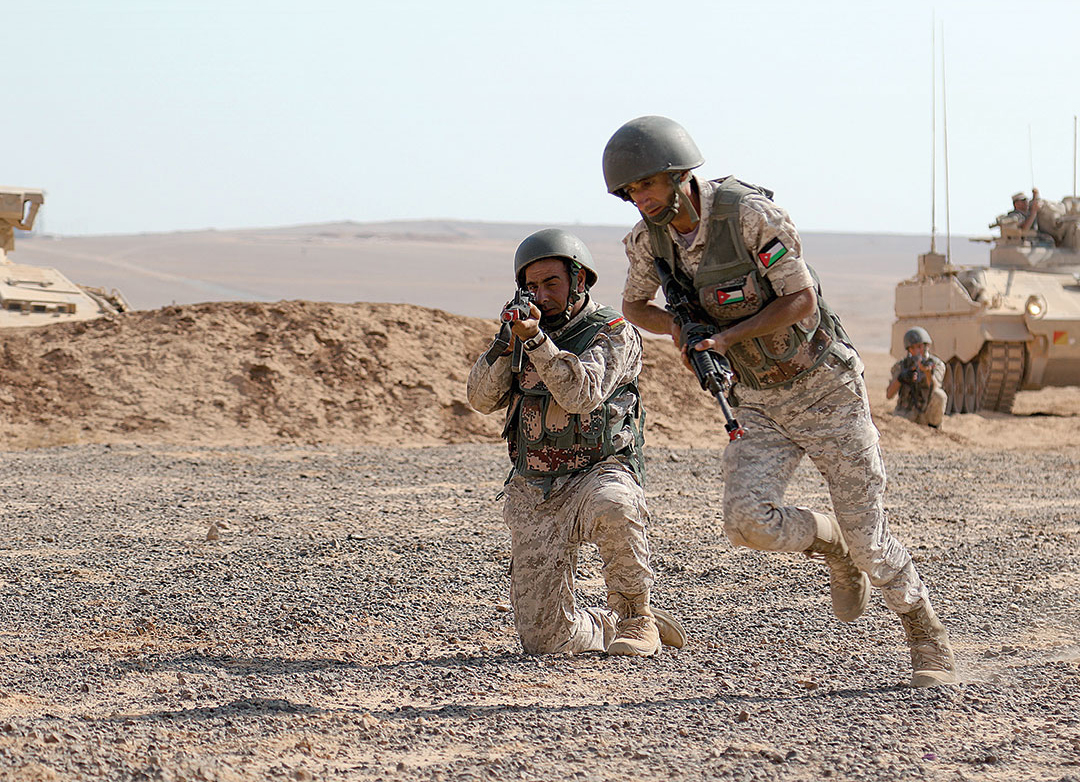
Sharing experiences with one another were more than 500 special operations troops from Jordan, the U.S., Italy, Qatar, Brunei, Saudi Arabia, Romania, Lebanon, Japan, the United Arab Emirates, France, Greece and Cyprus. They were assembled into task forces based on whether they specialized in land, sea or air missions.
Jordanian, Saudi and Qatari special operations joined forces to launch urban assaults by helicopter. Commandos from Jordan, Lebanon and Cyprus — taking instruction from a U.S. Air Force Special Tactics crew — practiced airdropping supplies to support operations behind enemy lines. In the Gulf of Aqaba, a joint special operations task force from Jordan, the U.S. and Qatar fast-roped from helicopters to search and seize a ferry in a hijacking scenario.
U.S. and Jordanian special operations troops addressed another complexity of the modern battlefield: countering enemy unmanned aerial vehicles.
A Jordan Armed Forces explosive ordnance disposal unit used robots, jammers and X-ray imaging to investigate a downed unmanned aerial vehicle, or drone. The goal was to exploit any intelligence the downed craft might provide and neutralize any explosives it might carry.
“We left today understanding how to integrate communications, overcome any language barriers, and how to respond to a very real scenario,” said U.S. Army Sgt. 1st Class Andrew Bird.
A more subtle demonstration of power engaged troops executing information operations — the use of information-related capabilities to influence, disrupt, corrupt or usurp the decision-making of adversaries while protecting one’s own. The culmination of those duties at Eager Lion was a leaflet drop by a Royal Jordanian Air Force crew.
Such old-school technology remained relevant in the fight against Daesh, when terrorists disrupted internet, television and radio communication in the Iraqi and Syrian towns they occupied. Leaflets alerted residents to upcoming battles, encouraged them to expose terrorist hideouts and steered them away from war zones.
Cyber preparedness was given special emphasis at Eager Lion, too. In fact, Soldiers from Jordan, Iraq, Kuwait and the U.S. got a real-world lesson at the exercise. The team was preparing to launch its cyber drill, when the JAF Cyber Incident Response Team detected — and eliminated — an attempted malware breach of their computer system.
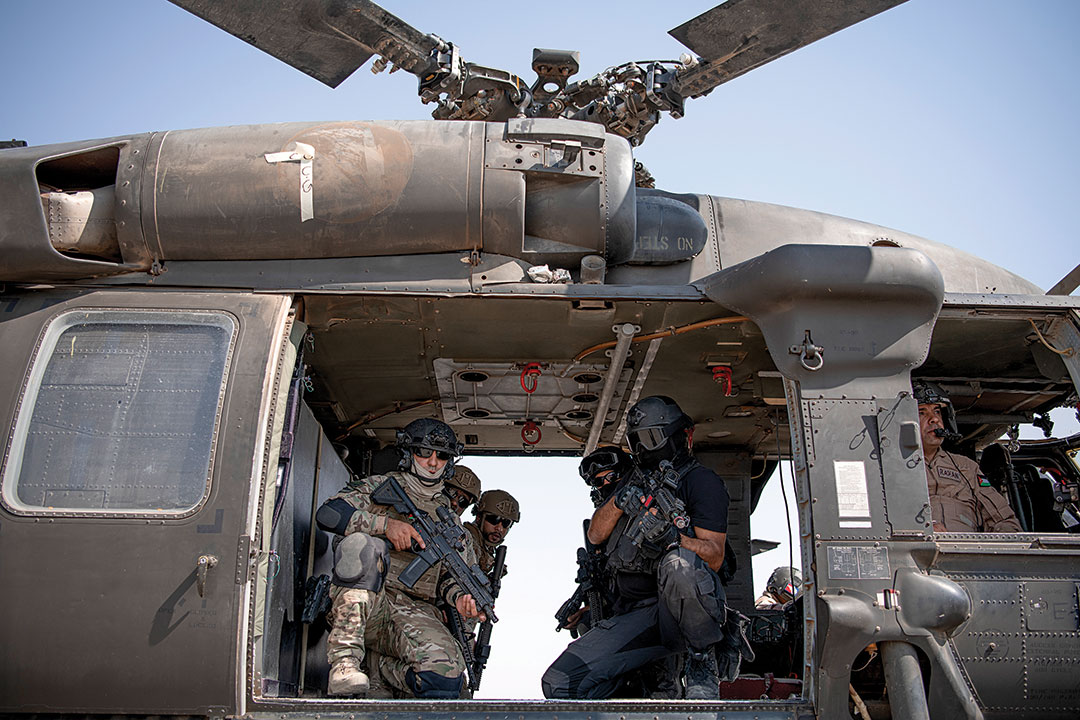
A member of the cyber team — Iraqi Lt. Col. Samer Emad — expressed satisfaction that participants from five nations managed to unify their procedures to stop malicious attacks. “Working with coalition forces, it’s a great feeling to see all these nations busy as bees defending and countering any threat that attempted to disrupt the operation,” Lt. Col. Emad said.
A Senior Leader Seminar that convened toward the end of Eager Lion 19 allowed commanders from nearly 30 nations to think strategically about security issues afflicting the region and the world. The main topics were cyber security, defending against chemical, biological, radiological, nuclear and ballistic missile attacks and countering extremist ideology.
Despite spectacular victories against Daesh fighters in Iraq and Syria, Jordanian officers urged their multinational partners to stay alert to any terrorist resurgence.
Jordanian forces continue to thwart attempts to smuggle weapons and drugs into the country, including explosives hidden in pomegranates, a Jordanian officer said during a presentation. “JAF was acting as the first line of defense in denying Daesh access to the region,” he said.
Daesh has moved into a “reconstruction phase” in which members retreat to desert and mountain hideouts to await redeployment, he said. Thousands of Daesh adherents remain in the region.
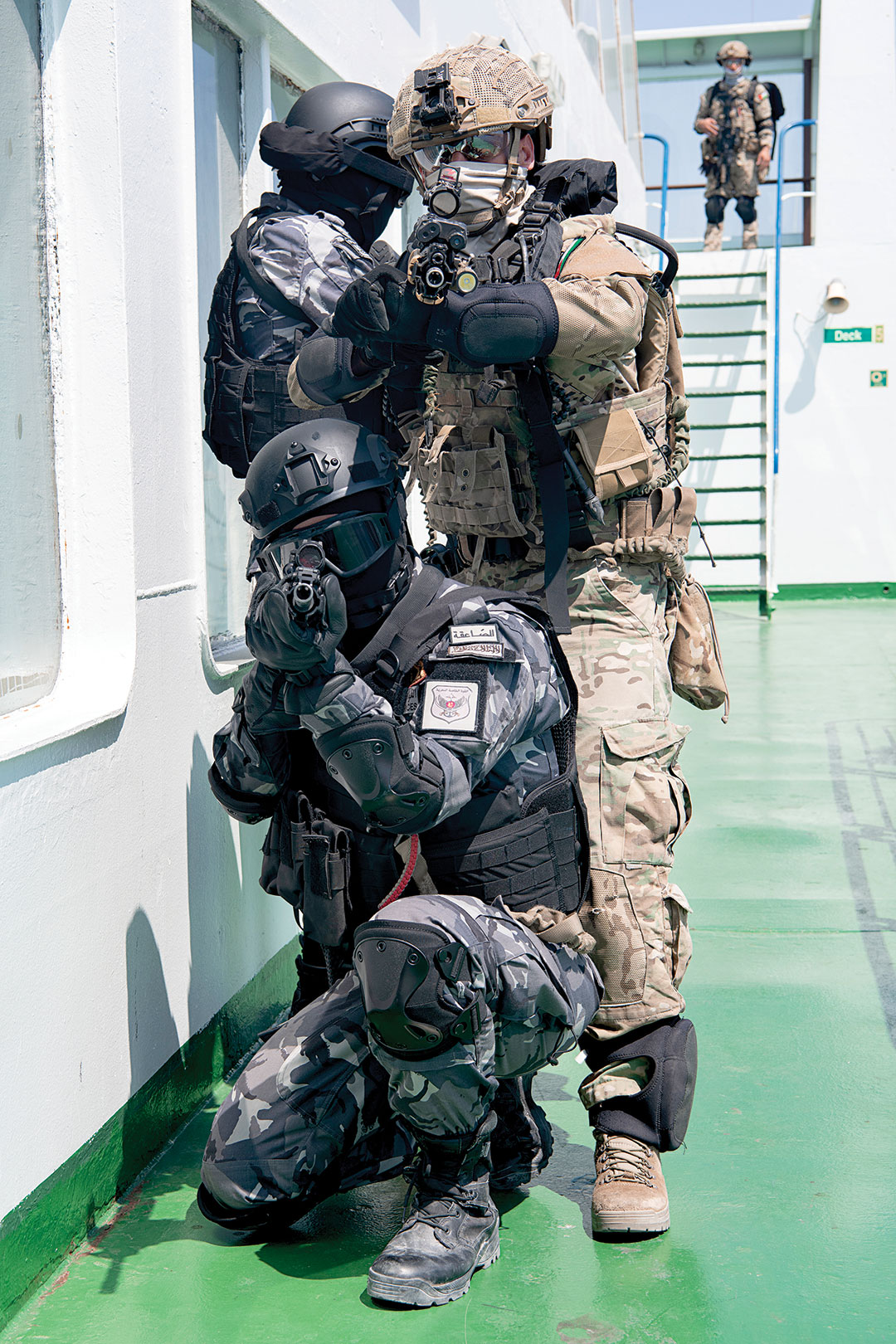
Information technology gives terrorists advantages they didn’t have decades ago, he said. The so-called mujahedeen in Afghanistan in the 1980s needed weeks to transmit propaganda through traditional media, but Daesh can trumpet its misdeeds in minutes through social media.
Jordan will host Eager Lion once again in 2021, giving would-be participants extra time to organize and commit troops to the exercise. After several years hosting the exercise, Gen. Al-Thalji will hand the reins to another commander because he accepted a promotion to command Jordanian forces in the northern sector of the country.
“This exercise has also increased the understanding and increased the degree of tolerance between our military forces,” Al-Thalji said. “We have been able to focus on social barriers and on the commonalities, not the differences, and what brings us together not what differentiates us.”
Eager Lion 19 showcased participant nations’ resolve to confront any adversary bent on dominating the Middle East or forcing its ideology on the region.
FAITH IN ACTION
Jordanian and U.S. Military Chaplains Lighten the Lives of Senior Citizens
UNIPATH STAFF
It was a special day at the Golden Age Home. Three imams in the Jordan Armed Forces, one playing a drum, performed a concert for dozens of elderly men and women assembled in the recreation room of the Amman retirement home.
What made the occasion even more festive were the gift bags handed out to residents. These were provided by U.S. Army chaplains who accompanied the imams to the retirement home as part of the Eager Lion 19 military exercise.
The Jordanian military’s connection to the retirement center runs deep. Not only are some of the residents former Soldiers, but the director of the center is retired Brig. Gen. Muna Haddadin, former head of nursing in the Jordan Armed Forces (JAF).
Brig. Gen. Muna gave the visiting chaplains and imams a thorough tour of the center, through the residential wings, recreation rooms, kitchen, laundry room and administrative offices.
“The visit of U.S. chaplains was great and made the seniors very happy,” she said. “They were especially happy for the gifts and the singing. It gave residents a sense that people care for them, even non-Jordanians.”
Jordanian military imams visit the retirement center weekly as part of their duties and, at the request of a resident, equipped the home with a library.
“I told my counterparts, the chaplains in the U.S military, that we have something in common and that is humanity,” said Sheikh Maj. Shadi Abedat, part of JAF’s Directorate of Iftaa. “As human beings, we love to see happiness for all, and we love to provide help to the elderly.”
Aside from the obvious charitable value of the visit, U.S. Army chaplain Maj. Scott Speight noted that it mimicked a humanitarian crisis that chaplains might encounter in the real world, if, for example, they met elderly patients in a camp for displaced people.
On another day during Eager Lion, U.S. and Jordanian chaplains visited an Army field hospital to simulate caring for sick and wounded Soldiers.
“We wanted the opportunity to work with imams in a real-world experience,” Maj. Speight said. “We had the opportunity to see things at the retirement home we would never see.”
The Golden Age Home, founded in 1979 as part of Jordan’s White Beds Society, houses 120 patients of all religions. During Eid al-Fitr in June 2019, His Majesty King Abdullah II bin Al Hussein visited the patients to check on their care. Ongoing renovations at the home came at the king’s request.
The charitable White Beds Society survives, thanks to contributions from the Jordanian government and outside donors. The government covers less than half of the 780 Jordanian dinars it costs to house a single resident each year.
Donations provide much of the center’s food, drinks and medical supplies, and the Japanese government provided free industrial-size washing machines and dryers in 2006. Volunteers supplement the 70 staffers that care for the residents 24 hours a day.
“We have many volunteers who bring pastry and gifts to them daily, which gives the seniors a huge lift to lighten their days,” Brig. Gen. Muna said. “Inside the home, we live as one family.”

